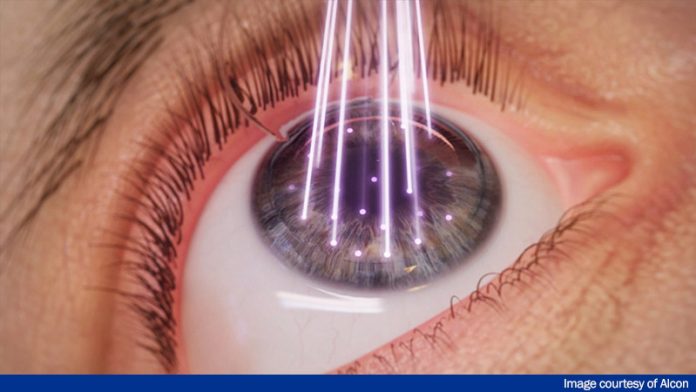
This case study focuses on the efforts of Elara Systems, Inc., and Alcon to create a robust virtual reality (VR) training experience for eye care professionals. Elara Systems is a creative studio located in Sacramento, CA, specializing in 3-D animation and XR development. Alcon is a global leader in eye care, offering surgical and vision care products that touch the lives of more than 260 million people in 140-plus countries each year living with conditions such as cataracts, glaucoma, retinal diseases, and refractive errors.
When Alcon’s quest to always be at the front of the pack in utilizing emergent technologies met with Elara’s drive for constant expansion of its capabilities, an evolutionary process occurred. In this case study, we observe the evolution of how Elara went from creating simple 3-D models and animations for Alcon all the way to developing a robust VR training and interactive product education and demonstration library.
Humble Beginnings
Elara started working with Alcon in 2009 creating 3-D animation highlighting the benefits and effectiveness of one of its contact lens solutions. The animation was a success and, in 2010, was followed by a project commissioned by Rustin Floyd, who is currently the global director, head of Healthcare Professional Training and Education at Alcon.
Rustin Floyd wanted Elara to create a 3-D animation highlighting the benefits of the Alcon WaveLight Refractive Suite (a collection of equipment for use in laser vision correction). One thing that stood out for Rustin Floyd was the fact that the people he showed the animation to actually thought it was a video due to the photorealistic quality of the piece. This inspired Alcon and Elara to ideate around creating even more compelling visual content.
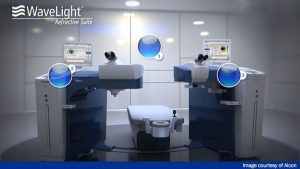
Rustin Floyd is a proponent of emergent technology, and several years after the WaveLight project, he reached out to Elara to create a VR piece that would take a viewer inside of the eye to see anatomy and physiology that cannot be seen without an invasive procedure. The resultant project was the Alcon Virtual Eye Experience.
As Rustin Floyd notes, “It’s one thing to teach about the eye and how it works…it’s another thing to stand inside the eye and teach how it works.”
The challenge of the Virtual Eye Experience was to engage and educate eye care professionals in a compelling way, unique to ophthalmology.
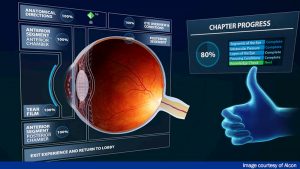
Going Live
After approximately four months of development, the Alcon Virtual Eye Experience was ready to show at the annual congress of the American Association of Ophthalmology (AAO) held in New Orleans in late 2017. AAO is a worldwide gathering of ophthalmologists and companies that provide medical devices, equipment, and support for the industry. Needless to say, this event was a big deal for Elara and Alcon.
The primary purpose behind debuting VR at AAO was to attract ophthalmologists and other potential customers to Alcon’s booth, to showcase Alcon’s commitment to training and education through the novel approach of virtual reality—a technology new to the ophthalmic space. Alcon designed free-standing VR kiosks where multiple VR headsets were stationed so attendees could view the Virtual Eye Experience.
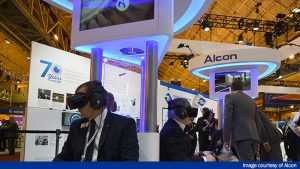
The Alcon booth was well-received, with lines of attendees queued up to view the Virtual Eye Experience. As the trade show progressed and more physicians were journeying through the eye, there was a realization that while the Virtual Eye Experience was captivating, the functionality of the experience could be even better. Specifically, there was an opportunity to help facilitate users’ engagement with the interactions while in the experience, bringing interactive elements directly to their hand controllers. Throughout the trade show, Rustin Floyd and Elara were diligently collecting feedback and then conceptualizing ways to improve the experience, ultimately making it more impactful and engaging for their customers.
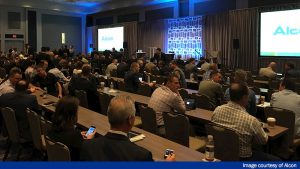
The success of the Virtual Eye Experience opened the doors to further VR development at Alcon, as the company was looking beyond a simple splash at a trade show. Working collaboratively, Elara and Alcon came up with numerous other applications for the technology.
Leveraging Content: Other Uses of VR and 3-D Assets
On the Vision Care side of Alcon’s business, Tyler Snyder, the global director of Commercial Development in Alcon’s Vision Care Franchise knew that his sales team, and the optometrists they visited, were weary of going through PowerPoint presentations on an iPad to go over new products and technologies. To enhance the sales experience, Snyder launched a fleet of Oculus Go’s to his sales team so they could put their customers into VR to view experiences featuring Alcon’s products. The roll-out of this program was met with enthusiasm from his sales team and the optometrists who viewed the presentations.
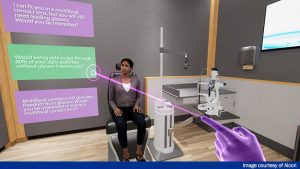
More recently, during the COVID-19 pandemic, Alcon transformed its trade shows onto virtual, Web-based platforms. Utilizing Elara’s Docent technology, 3-D models taken from a VR product presentation that was in development were placed into a Web-accessible 3-D operating room environment. Attendees could view the equipment from their computers or tablets and move around the virtual 3-D space using their mouse pad. Additionally, they could be joined by Alcon sales representatives using a Web-based real-time communication platform similar to Zoom or Microsoft Teams. The Alcon representative could go over the product’s features and benefits and also provide training tips on how to utilize the devices.
Alcon’s willingness to explore new methods of communication and engagement is summed up succinctly by Rustin Floyd, “One of the challenges of a medical device company is finding technology to educate our healthcare professionals in a way that is as sophisticated, and as engaging, as the medical devices themselves.”
As the depth and breadth of Alcon’s digital education library continued to expand, it became clear to Elara and Alcon that reusing previously created models and environments created efficiencies that drove down price and development time. This allowed for the production of more innovative VR applications while keeping prices within reason. This allowed for even more innovation into immersive training.
Let’s Start Training
Elara and Alcon realized that the immersive nature of VR made it ideal for learning and training. As Rustin Floyd points out, “There is no other training and education medium, outside of hands-on experience, that immerses and engages the audience like virtual reality does. There are no distractions, no multi-tasking; the viewer is completely enveloped in the learning environment.”
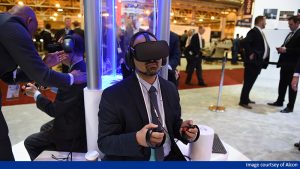
Early on, Elara developed an eye anatomy and physiology trainer to help Alcon associates learn more about the eye itself. Elara was able to incorporate 3-D models developed for use in the Virtual Eye Experience and employ them in the training application. This helped reduce cost and production time because the entire experience was not built from scratch.
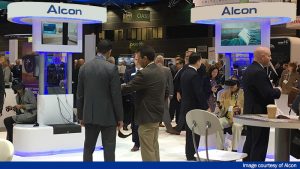
New Alcon products continued to be regularly featured in VR experiences at trade shows. However, there was a continued ask from ophthalmologists: They wanted more content relating to surgical training in VR. At the next AAO annual congress in Chicago, in 2018, Alcon had multiple VR kiosks featuring surgical case studies—filmed in 360-degree video—that could be viewed by surgeons. Many surgeons spent exceedingly long periods of time watching the surgeries.
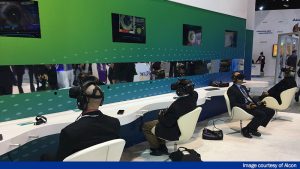
Based on the level of interest among surgeons for more surgical training, Alcon commissioned the creation of the Virtual Surgical Site Visit. To create this experience, the Elara team and a 360-degree video crew went to a leading eye institute. They filmed multiple surgeries performed by a leading U.S. ophthalmologist. In addition to being able to be virtually inside the operating room, viewers could watch the surgery from multiple angles and on multiple display screens while learning key insights from the case studies.
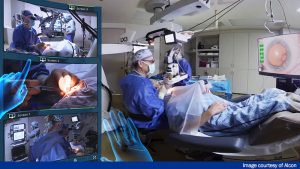
Despite the success of the surgical training experiences, there was one persistent ask from all of the surgeons: They wanted to be able to practice surgery in VR. They also wanted the force-feedback enabled by haptic technology so they could hold a device in their hand and feel as if they were actually performing a real cataract surgery. It’s quite possible that surgical simulation could be the next frontier Alcon and Elara explore.
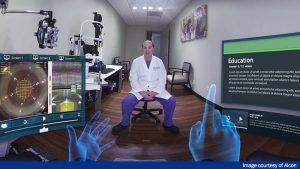
Key Elements
The relationship that exists between Elara and Alcon is not necessarily unique, but it requires several key elements in order to evolve. First, the ability to collaborate is essential. The free-flowing exchange of ideas and feedback between the two teams is fundamental to success. Both parties need to be able to talk to each other without reservation, allowing the best ideas to rise to the surface.
Leveraging analytics to measure success was the key element of evolutionary growth driving future projects. Key performance indicators (KPIs) throughout the projects continued to evolve—from collecting data on the amount of time spent in VR to the total impressions gathered from the viewers. The more complex the project gets, the more advanced the KPIs.
Lastly, a key part of Elara and Alcon’s collective success in VR was dependent on having strong and determined internal advocates within the organization. It is important to have tech-forward advocates, like Rustin Rustin Floyd and Tyler Snyder at Alcon, to help drive VR initiatives.
Looking back on the journey, Rustin Floyd notes, “By allowing our customers to experience Alcon’s innovative technology—whether in person at one of our Alcon Experience Centers or virtually through our VR technology—this can help eye care professionals have more confidence in our products while helping us deliver on our mission of helping people See Brilliantly.”




